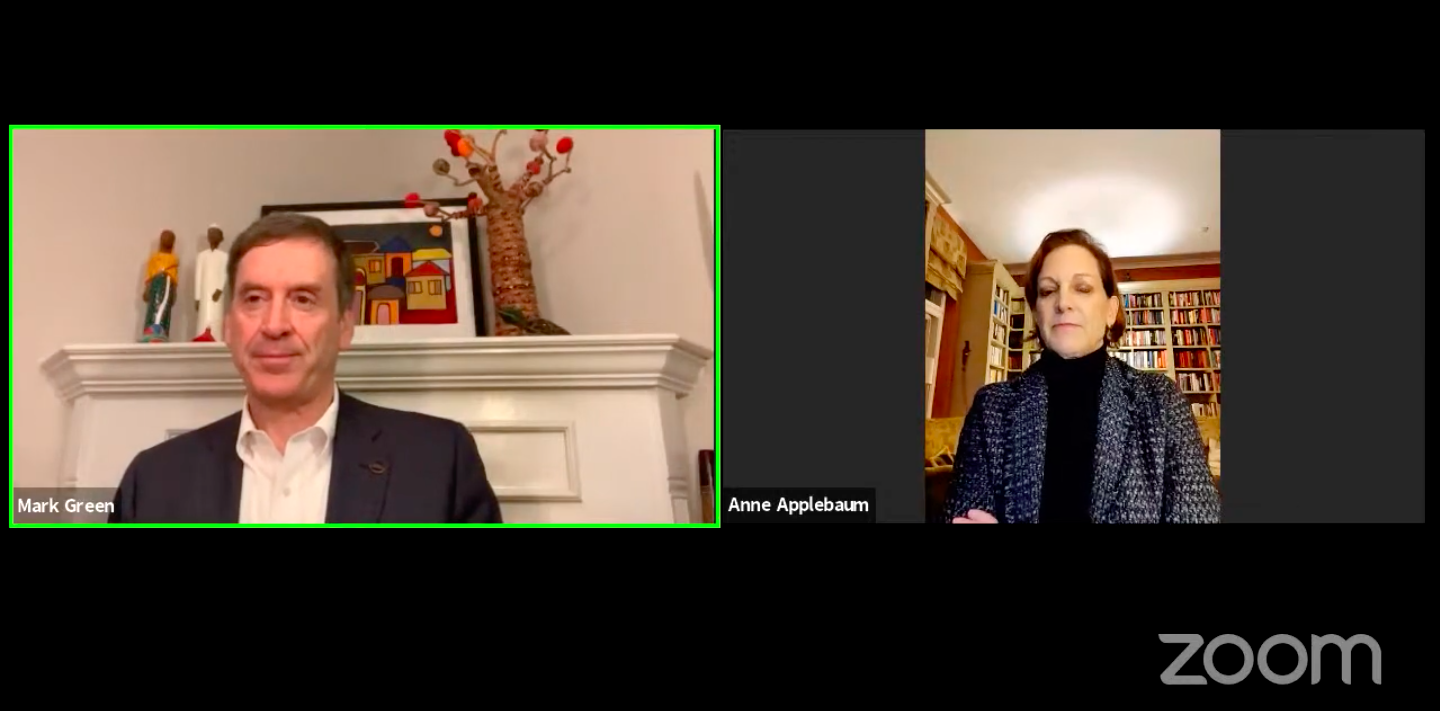Democracy under siege? Author warns about the appeal of authoritarianism

Over the past decade, authoritarianism has been slowly rising in the West, warns journalist and historian Anne Applebaum, who contends that democracy is under siege, and that defending it will be harder than most assume, as political systems with radically simple beliefs are inherently appealing, especially when they benefit the loyal, to the exclusion of everyone else.
Applebaum’s observations are detailed in her newest book, “Twilight of Democracy: The Seductive Lure of Authoritarianism,” which she discussed during an “Authors and Insights Book Talk Series” event hosted by The McCain Institute for International Leadership at ASU on Dec. 9.
“The book is really intended as a kind of warning,” Applebaum said. “The audience is anybody who has been watching our politics in Western and European countries over the last decade, like I have, and felt a kind of sense of discontent — and wondered what it was.”

The McCain Institute's Executive Director Ambassador Mark Green discusses Anne Applebaum's new book during an Authors and Insights event, hosted virtually on Dec. 9.
Applebaum was inspired to write the book after witnessing the rise of authoritarian and nationalist parties in Poland, and seeing the phenomenon repeated in the United States and United Kingdom. Applebaum argues that popular misconceptions around illiberalism and the different types of democracy have actually aided the rise of authoritarian and nationalist political parties, as popular culture has convinced many people that there are only two forms of government: democracy and dictatorship.
“One of the things that has become very clear, over the last decade, is that there are some forms of politics that are in between,” Applebaum said. “We have seen for example, what it looks like in Hungary to have a prime minister who, once he took power, began to subtly and unsubtly alter the political system, to make it very difficult for him to lose another election. And we saw the same thing in Poland. But these things are not always immediately obvious.”
These anti-democratic practices gradually weaken democratic spirit, norms and eventually the rule of law inside of democracies, Applebaum believes. She adds that this is a strategy for gaining and retaining power that all authoritarian movements have in common.
“One of the features of this new phenomenon — whatever you want to call it, illiberal movement, or populist movement, or far-right movement, in Poland and in Hungary and in other countries — is that it seeks to eliminate the current class of leaders and put in a new kind of person,” Applebaum explained. “Many of these movements and parties operate along a similar principle: that what we need to do is get rid of everybody. Whether they know anything, whether they’re qualified, whether they should be there or shouldn’t be there. And we should replace them with people that are loyal to us.”
In two passages of “Twilight of Democracy,” Applebaum writes that, “If history is anything to go by, all societies eventually will” turn against democracy, and that “it is possible that we are already living through the twilight of democracy, that our civilization may be heading for anarchy or tyranny.” But she told the audience that it was a mistake to assume that a slide toward authoritarianism is a foregone conclusion, and that the book is a warning, rather than a prediction.
“I wanted everyone to remember that history is always radically open. There are always more paths. It is neither the case that the arc of history bends towards progress and democracy, as we once hoped and one of our former presidents said, nor is it the case that we’re doomed,” said Applebaum. “I wanted people to realize we are at a moment where many things are possible. What happens next depends on how engaged we are civically, how creative we are about reforming our institutions, and — in my view — how creative we can be about changing the way the internet works and the information space, which have been so badly distorted. Whether we can tackle our problems and whether we can engage with them and move on. That will determine the answer.”
Top photo courtesy of pixabay.com
More Law, journalism and politics

Exhibit uses rare memorabilia to illustrate evolution of US presidential campaigns
After one of the most contentious elections in history, a new museum exhibit offers a historical perspective on the centuries-old American process.“We The People! Electing the American President” had…

TechTainment conference explores the crossroads of law, technology, entertainment
What protections do writers, actors, producers and others have from AI? Will changing laws around name, image and likeness (NIL) eliminate less lucrative college sports programs?And what does…

How to watch an election
Every election night, adrenaline pumps through newsrooms across the country as journalists take the pulse of democracy. We gathered three veteran reporters — each of them faculty at the Walter…